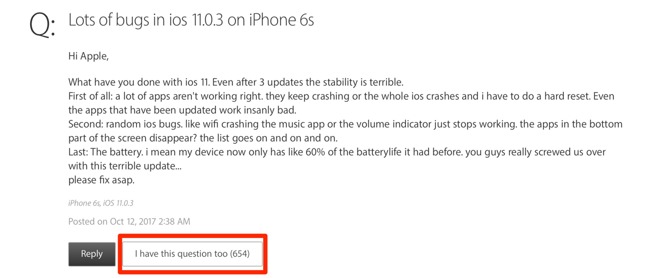Problems with battery life and instability proliferate on social media and Apple support forums after the launch of iOS 11, but have persisted through three sub-point updates, don't seem to have a common cause, or are easily rectifiable.

As with just about every iOS update, Apple's first release of a major operating system appears to have induced some problems, where there were previously none. Accounts abound of general sluggishness, crashing, and battery life problems.
However, looking closer at the reports and phone generations impacted, there does not appear to be a common model afflicted by problems induced by the new operating system. Users across nearly all generations of iPhones, including the iPhone 7 family from 2016 are reporting issues stemming from the update. The iPhone 8 is seemingly not impacted by issues in iOS 11.
The sub-point updates fixed some user's complaints -- but not many. Those updates were likely issued to address critical security problems.
One AppleInsider staffer experienced rapid battery drain on an iPhone SE. Initial testing with the beta of iOS 11.1 shows greatly improved battery life with that unit -- but another iPhone SE in the same household purchased at about the same time never experienced any issues, and is still on iOS 11.0.3.
In the same location, a pair of iPad Airs, a pair of iPhone 7 Plus, and an iPhone 6s are seeing no problems with iOS 11.
Another editor is presently seeing a profound impact on battery life on a first-generation iPad Pro, and having problematic notification hand-off between an iPhone SE and Apple Watch as a result of the update. Additionally, on both devices, the AppleInsider editor is seeing general performance problems induced by the operating system.
Working with the same data set that continues to be collated from Genius Bars since 2016's "Touch disease" evaluation, there appears to have been a slight uptick in incidents involving iPhones, but not iPads, after the release of iOS 11, as opposed to the months before. However, the prevalence is about the same as in the shift from iOS 9 to iOS 10 -- and the number of hardware repairs were deemed necessary as in previous years before and after an OS upgrade is essentially static.
This suggests that something in iOS 11 is to blame, and will likely be rectified in future updates to iOS.
It is important to note that while there are seemingly a large number of issues, Apple's iOS user base is larger than it ever has been before, and people that aren't having problems also aren't typically vocal about it.
Given the lack of hardware replacement sagas as a result of the update, and the lack of a notable increase in Genius Bar traffic year-over-year, this year's cycle appears no different than in any previous year. In the meantime, AppleInsider is working on a troubleshooting guide to ease or solve issues associated with iOS 11.


